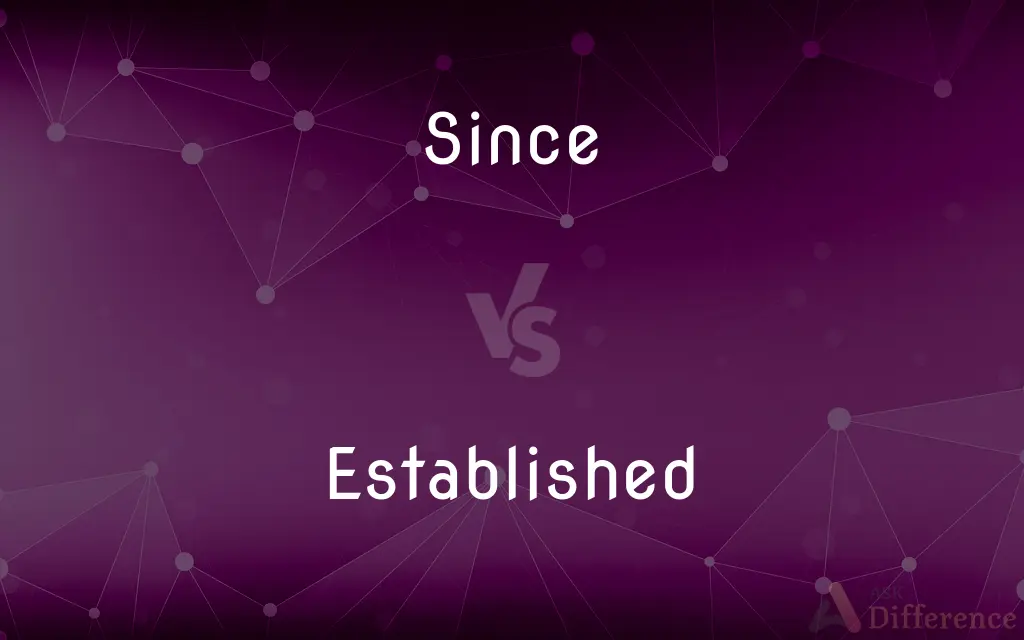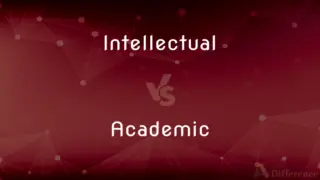Since vs. Established — What's the Difference?
By Urooj Arif & Maham Liaqat — Updated on March 18, 2024
"Since" indicates the time from a particular point, focusing on duration, while "established" refers to something being founded or set up, emphasizing its inception.

Difference Between Since and Established
Table of Contents
ADVERTISEMENT
Key Differences
"Since" is primarily used to denote the starting point of a period up to the present, highlighting the passage of time. It can be used in various contexts, such as in time-related statements or to explain reasons. For instance, one might say, "since 2010," to refer to the period from 2010 to now. On the other hand, "established" pertains to the creation or foundation of something, such as a business or organization. This term underscores the act of instituting or bringing into being, often with a formal or official connotation.
While "since" can serve as a conjunction, preposition, or adverb in sentences, illustrating time-related nuances, "established" functions as an adjective or past participle, describing the state of being set up or instituted. For example, using "since" in a sentence might look like, "Since the company started," compared to "established," which could be used as, "an established firm."
In terms of usage, "since" requires a reference point, either a specific time or an event, to anchor the temporal duration it describes. This reference point sets the stage for understanding the length of time discussed. Conversely, "established" refers to the act of founding or setting up, which might not necessarily involve a specific or precise time frame but rather focuses on the act's outcome.
"Since" often implies a continuity or ongoing situation from the past into the present, suggesting that the action or condition it refers to has persisted over the specified period. In contrast, "established" denotes a completed action, the result of which is a current state or condition that typically remains static or unchanged unless actively altered.
The nuances of "since" and "established" also reflect their utility in conveying different aspects of time and establishment. "Since" is versatile, used in everyday language to relate personal experiences or historical events, whereas "established" carries a formal tone, commonly found in business, academic, or historical contexts to denote solidity, tradition, or reputation.
ADVERTISEMENT
Comparison Chart
Part of Speech
Conjunction, preposition, adverb
Adjective, past participle
Primary Function
Indicates the start of a period up to now
Describes something being founded or created
Focus
Duration and continuity
Act of founding or creating
Usage Context
Time-related statements or reasons
Describing the state or quality of something
Implication
Ongoing situation from the past into the present
Completion and current static state
Compare with Definitions
Since
As a conjunction relating to time.
He's been resting since he arrived.
Established
Indicating something has been accepted or acknowledged.
The procedure is now firmly established.
Since
As a preposition indicating the starting point of a period.
I haven't seen her since Monday.
Established
Referring to something firmly rooted or widely recognized.
He is an established author.
Since
Referring to a specific past time or event.
Nothing has been the same since that day.
Established
Denoting something has been proven or validated.
The theory was established through extensive research.
Since
Used to indicate causation.
Since you're not interested, we'll go without you.
Established
Describing something officially set up or founded.
The museum was established in 1952.
Since
Indicating a continuation from a past point in time to the present.
She has been working there since 2005.
Established
Describing a business or institution that has been in existence for a long time.
It's one of the city's most established restaurants.
Since
From then until now or between then and now
They left town and haven't been here since.
Established
To cause (an institution, for example) to come into existence or begin operating; found; set up.
Since
Before now; ago
A name long since forgotten.
Established
To bring about; generate or effect
Establish goodwill in the neighborhood.
Since
After some point in the past; at a subsequent time
My friend has since married and moved to California.
Established
To place or settle in a secure position or condition
They established me in my own business.
Since
Continuously from
They have been friends since childhood.
Established
To cause to become regular or usual
Established the habit of going to bed early.
Since
Intermittently from
She's been skiing since childhood.
Established
To cause to be able to grow or thrive
The tree needs to be watered to help it become established.
Since
During the period subsequent to the time when
He hasn't been home since he graduated.
Established
To cause to be recognized and accepted
A discovery that established his reputation.
Since
Continuously from the time when
They have been friends ever since they were in grade school.
Established
To introduce and put (a law, for example) into force.
Since
Inasmuch as; because
Since you're not interested, I won't tell you about it.
Established
To prove the validity or truth of
The defense attorneys established the innocence of the accused.
Since
From a specified time in the past.
I met him last year, but haven't seen him since.
A short/long time since
Established
To make a state institution of (a church).
Since
From: referring to a period of time ending in the present and defining it by the point in time at which it started, or the period in which its starting point occurred.
Established
Simple past tense and past participle of establish
Since
Continuously during that period of time.
I have known her since last year.
Established
Having been in existence for a long time and therefore recognized and generally accepted.
Since
At certain points during that period of time.
Established
Of a religion, church etc.: formally recognized by a state as being official within that area.
Since
From the time that.
I have loved you since I first met you.
Established
(Model, procedure, disease) Explicitly defined, described or recognized as a reference.
Since
Because.
Since you didn't call, we left without you.
Established
Brought about or set up or accepted; especially long and widely accepted; as, distrust of established authority; a team established as a member of a major league; enjoyed his prestige as an established writer; an established precedent; the established Church. Contrasted with unestablished.
Since
(obsolete) When or that.
Established
Securely established; as, an established reputation.
Since
From a definite past time until now; as, he went a month ago, and I have not seen him since.
We since become the slaves to one man's lust.
Established
Settled securely and unconditionally.
Since
In the time past, counting backward from the present; before this or now; ago.
How many ages since has Virgil writ?
About two years since, it so fell out, that he was brought to a great lady's house.
Established
Conforming with accepted standards.
Since
When or that.
Do you remember since we lay all night in the windmill in St. George's field?
Established
Shown to be valid beyond a reasonable doubt; as, the established facts in the case.
Since
From the time of; in or during the time subsequent to; subsequently to; after; - usually with a past event or time for the object.
The Lord hath blessed thee, since my coming.
I have a model by which he build a nobler poem than any extant since the ancients.
Established
Introduced from another region and persisting without cultivation; - of plants.
Since
Seeing that; because; considering; - formerly followed by that.
Since that my penitence comes after all,Imploring pardon.
Since truth and constancy are vain,Since neither love, nor sense of pain,Nor force of reason, can persuade,Then let example be obeyed.
Established
Brought about or set up or accepted; especially long established;
The established social order
Distrust the constituted authority
A team established as a member of a major league
Enjoyed his prestige as an established writer
An established precedent
The established Church
Established
Securely established;
An established reputation
Holds a firm position as the country's leading poet
Established
Settled securely and unconditionally;
That smoking causes health problems is an accomplished fact
Established
Shown to be valid beyond a reasonable doubt;
The established facts in the case
Established
Conforming with accepted standards;
A conventional view of the world
Established
Introduced from another region and persisting without cultivation
Common Curiosities
Can "since" and "established" be used interchangeably?
No, because they serve different purposes; "since" focuses on time duration, while "established" on the act of founding.
Is "since" only used in past contexts?
Mostly, yes. "Since" refers to a period extending from the past to the present.
What distinguishes "established" from "founded"?
"Established" often implies a degree of recognition or success following the founding, whereas "founded" simply denotes the act of starting something.
Can "established" only refer to businesses?
No, "established" can refer to any entity, concept, or practice that has been founded or set up.
What does "since" imply in a sentence?
"Since" implies a continuation or duration from a specified time or event to the present.
What role does "established" play in historical contexts?
It denotes the creation or inception of institutions, practices, or entities at a specific point in history.
Does "established" imply quality?
Often, yes. Being "established" can suggest a level of quality, reputation, or reliability.
Can "since" refer to future events?
No, "since" is used to discuss periods extending from the past to the present.
How does the use of "since" affect the understanding of time in a narrative?
It provides clarity on the duration and progression of events or states over time.
What does it mean when a company is described as "established"?
It suggests the company has been in operation for a significant period and likely enjoys stability or reputation.
How do you use "since" to explain causation?
By linking an effect to a reason: "Since it rained, the game was canceled."
How does "since" function grammatically?
It can function as a conjunction, preposition, or adverb, depending on its use in a sentence.
Why is "since" important in narratives?
It helps establish timelines and causality, linking events or states across time.
Is "established" always positive?
Generally, yes, but context matters. It usually conveys stability or success but can be neutral depending on usage.
What signifies an "established" tradition or practice?
It is one that has been accepted and followed for a significant period, often passed down through generations.
Share Your Discovery

Previous Comparison
Intellectual vs. Academic
Next Comparison
Delhivery vs. DeliveryAuthor Spotlight
Written by
Urooj ArifUrooj is a skilled content writer at Ask Difference, known for her exceptional ability to simplify complex topics into engaging and informative content. With a passion for research and a flair for clear, concise writing, she consistently delivers articles that resonate with our diverse audience.
Co-written by
Maham Liaqat















































